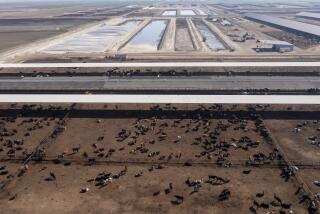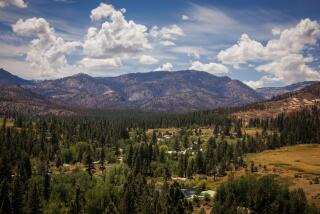‘Code of West’ Sets City Slickers Straight
- Share via
LOVELAND, Colo. — Living in the country can mean spectacular views, a sense of solitude and wide open spaces.
It can also mean impassable roads covered with 6-foot snowdrifts, a hanging cloud of smoke from ditch-burning operations and an unwelcome visit from a herd of wandering cattle.
In other words, country life is different from city life.
Realizing the differences, Larimer County Commissioner John Clarke set out to educate, if not warn, prospective residents of the county’s rural areas. The result is, “The Code of the West . . . The Realities of Rural Living,” a 13-page booklet that outlines some facts about living outside city limits.
“It’s for people who may have lived in cities all their lives and decided they’d like to live in the country and would enjoy that lifestyle,” Clarke said. “That’s great, but they need to know there are some things that are different that they might not realize.”
Along with help from real estate brokers, the county extension office, Colorado State University and various individuals, Clarke crafted the code that he admits is subject to revisions and changes.
“I welcome comments from anyone. It’s subject to review,” said Clarke, who hopes the code will become part of the county’s land-use system.
Consider these tidbits from the booklet:
* Access: “The fact that you can drive to your property does not necessarily guarantee that you, your guests and emergency service vehicles can achieve that same level of access at all times.”
Specifically, emergency response times may be longer and maintenance of some county roads is the responsibility of private road associations, not always the county.
* Utility service: “Water, sewer, electric, telephone and other services may be unavailable or [not] operate at urban standards. Repairs can often take much longer than in towns and cities.”
Not all wells can be used for watering landscaping or livestock, and trash removal can cost more in rural areas than in a city.
* Property: “There are many issues that can affect your property. It is important to research these items before purchasing land.”
Rural residents should know that not all lots are buildable. If your land has an easement, it may require you to allow construction of roads or other utility lines across your property.
* Mother Nature: “Residents of the country usually experience more problems when the elements and earth turn unfriendly.”
A home nestled among the ponderosa pines may seem pleasing, but it can turn to disaster should a forest fire strike. And although sharing the land with wildlife can be a delight, rural development encroaching on the animals’ habitat can make for dangerous encounters. Pets and trash need to be handled properly to avoid problems.
* Agriculture: “The people who tamed this wild land brought water to the barren, arid east slope of the Rockies through an ingenious system of water diversion. This water has allowed agriculture to become an important part of our environment. Owning rural land means knowing how to care for it.”
Farmers work long and odd hours, often with loud equipment. “Do not expect county government to intervene in the normal day-to-day operations of your agribusiness neighbors,” the code states.
“People who are sensitive to chemicals should not live out in the country,” Clarke said. “Farmers have to use pesticides and herbicides for their crops, which are often applied by planes.”
Tom Bender, a tree farmer near Bellvue, has seen firsthand the misconceptions new residents may have about living miles from paved streets and a convenience store on every other corner.
“We get some turnover up here after every big snowstorm,” said Bender, a member of the Larimer County Farm Bureau. “After a big snowstorm when the electricity goes out, we see a mass migration.”
Bender, who has lived in rural Larimer for 20 years, said when some residents realize they have to drive their kids a distance to catch the school bus or to run errands, they miss the conveniences of city living.
“This is something people need to be educated about,” he said.
More to Read
Sign up for Essential California
The most important California stories and recommendations in your inbox every morning.
You may occasionally receive promotional content from the Los Angeles Times.













